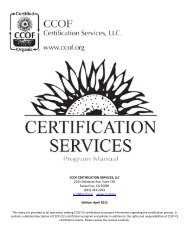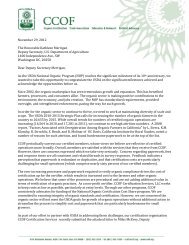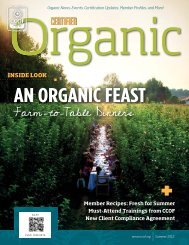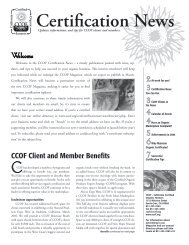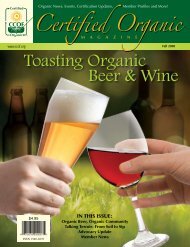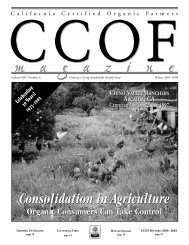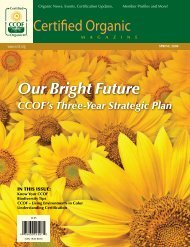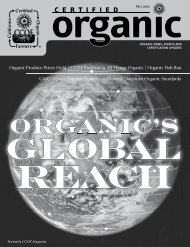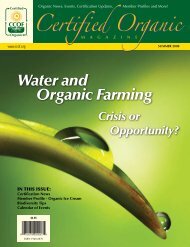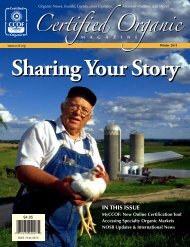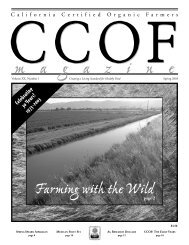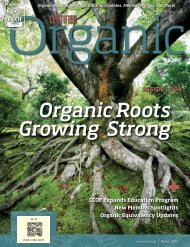CCOF International Standard Progam Manual DISINTEGRATED
CCOF International Standard Progam Manual DISINTEGRATED
CCOF International Standard Progam Manual DISINTEGRATED
Create successful ePaper yourself
Turn your PDF publications into a flip-book with our unique Google optimized e-Paper software.
with written consent to receive from the other certifier or<br />
certifiers the following upon application:<br />
Current certification decisions,<br />
Any major non-compliances,<br />
Evidence of corrective actions(s),<br />
Copies of transactions certificates or information<br />
regarding sales, and/or<br />
Any denials or suspension/revocations.<br />
For such dual or multiple certification operations, <strong>CCOF</strong><br />
CS will make every effort to coordinate the inspection<br />
with the other certifier(s) to reduce costs to the client.<br />
Clients must enroll in the <strong>CCOF</strong> <strong>International</strong> <strong>Standard</strong><br />
program before harvest or production of the product in<br />
order to ensure that that compliance can be verified prior<br />
to export.<br />
2.2 CERTIFICATES OF COMPLIANCE<br />
If <strong>CCOF</strong> finds that a client meets the applicable standards<br />
described in Section 4 of this manual, <strong>CCOF</strong> will issue an<br />
<strong>International</strong> <strong>Standard</strong> Certificate of Compliance which<br />
will indicate verification of equivalency to EU 834/2007<br />
and the Switzerland Organic Farming Ordinance, as<br />
applicable.<br />
2.3 SHARING OF CERTIFICATION DOCUMENTS WITH<br />
OUTSIDE PARTIES 12<br />
<strong>CCOF</strong> CS may provide foreign accreditation agencies<br />
and/or import authorities with copies of inspection<br />
reports when required exclusively for the purpose of<br />
gaining import licenses for <strong>CCOF</strong> clients enrolled in the<br />
<strong>CCOF</strong> <strong>International</strong> <strong>Standard</strong> program or their customers.<br />
When inspection reports etc. are provided <strong>CCOF</strong> will<br />
notify the client of this occurrence.<br />
2.4 ON-SITE INSPECTION PROVISIONS 13<br />
In addition to the on-site provisions in the <strong>CCOF</strong><br />
Certification Services Program <strong>Manual</strong>, <strong>CCOF</strong><br />
<strong>International</strong> <strong>Standard</strong> program inspections for clients<br />
enrolled in the <strong>CCOF</strong> <strong>International</strong> <strong>Standard</strong> program<br />
must also include identification and investigation of areas<br />
of risk, review of records and accounts, productions/ sales<br />
reconciliation on farms, and input/output reconciliation<br />
and trace back audits in processing and handling.<br />
<strong>CCOF</strong> <strong>International</strong> <strong>Standard</strong> program inspections will also<br />
include the full inspection of all conventional storage<br />
areas, including, but not limited to, conventional input<br />
and seed storage facilities 14 .<br />
Inspectors may take samples for testing of products not<br />
authorized for organic production or for checking<br />
production techniques not in conformity with the organic<br />
production rules. Effective January 2014, samples will be<br />
taken from at least 5% of all operations enrolled in the<br />
<strong>International</strong> <strong>Standard</strong> Program annually, with a<br />
minimum of one per year 15 . Selection of operation(s) to<br />
be sampled will be based on risk of noncompliance, and<br />
will take into account all stages of production,<br />
preparation and distribution. Samples may also be taken<br />
and analyzed for detecting possible contamination by<br />
products not authorized for organic production. However,<br />
such analysis shall be carried out where the use of<br />
products not authorized for organic production is<br />
suspected 16 .<br />
2.5 ADDITIONAL (ANNOUNCED & UNANNOUNCED)<br />
ON-SITE INSPECTIONS 17<br />
<strong>CCOF</strong> CS reserves the right to conduct additional on-site<br />
inspections of both applicants for certification and<br />
certified operations to determine compliance with the<br />
applicable <strong>International</strong> organic production and handling<br />
regulations. At minimum, <strong>CCOF</strong> CS must conduct<br />
unannounced inspections of at least 10% of the total<br />
<strong>CCOF</strong> <strong>International</strong> <strong>Standard</strong> program clients, effective<br />
January 2014 18 .<br />
<strong>CCOF</strong> CS may use any of the following criteria when<br />
deciding to assign an unannounced inspection to an<br />
operation:<br />
Possible non-compliant activity; or<br />
Potential for drift; or<br />
Observation of specific crops or production<br />
activities or<br />
Any logical reason or<br />
Random selection<br />
The <strong>International</strong> Organic Accreditation Services (IOAS)<br />
may require that additional inspections be performed by<br />
<strong>CCOF</strong> CS for the purpose of determining compliance or<br />
equivalence with applicable <strong>International</strong> organic<br />
production and handling regulations. Additional<br />
inspections may be announced or unannounced at the<br />
discretion of the <strong>CCOF</strong> CS or as required by IOAS.<br />
13<br />
EEC 889/2008 Article 32(d) and Article 66<br />
14<br />
EEC 889/2008 Article 66(3)<br />
15 EEC 889/2008 Article 65 (2) as amended by EEC 392/2013<br />
16<br />
EEC 889/2008 Article 65 (2)<br />
17<br />
17065 Guide 7.9, EEC 889/2008 Article 63(1)(c) & 65(4) & COO Operating<br />
<strong>Manual</strong> C2.9<br />
18 EEC 889/2008 Article 92(c) as amended by EEC 392/2013<br />
<strong>CCOF</strong> <strong>International</strong> <strong>Standard</strong> Program <strong>Manual</strong> Edition: October 2013 Page 6 of 13



